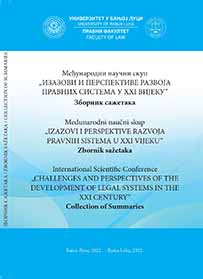ПРОБЛЕМАТИКА ГЕНОЦИДА У МЕЂУНАРОДНОМ КРИВИЧНОПРАВНОМ СИСТЕМУ
THE ISSUE OF GENOCIDE IN THE INTERNATIONAL CRIMINAL LAW SYSTEM
Author(s): Nemanja DanilovićSubject(s): Law, Constitution, Jurisprudence, Criminal Law, Civil Law, International Law, Human Rights and Humanitarian Law
Published by: Правни факултет Универзитета у Бањој Луци
Keywords: Genocide; genocidal intent; international criminal law; international crime; protected group;
Summary/Abstract: Genocide is considered one of the most severe international crimes affecting the entire international community. However, it was not defined and put into the international criminal justice framework until a few years after the end of World War II in the International Convention on the Prevention and Punishment of the Crime of Genocide, adopted by the United Nations General Assembly on December 9, 1948. In modern legal practice, genocide is often called “the crime of crimes” as its perpetration aims at the total or partial destruction of a national, ethnic, religious, or racial group as such. However, the issue of genocide is intricate and should be further developed and studied within the international criminal law framework. The paper will define the concept of international crime, the concept of genocide, genocidal intent as a prerequisite for the existence of genocide, the subjective and objective elements of genocide, the concept of protected groups, and will also discuss recent examples of genocide such as the genocide in Rwanda. Moreover, abuse of the term genocide will be considered on the example of the events from Srebrenica. This paper aims to present the latest research on the issue of genocide as a crime based on relevant sources of journal literature and court practice. Genocide is an act that is used daily as a tool to achieve certain geopolitical and international interests.
Journal: Зборник радова Међународни научни скуп „Изазови и перспективе развоја правних система у XXI вијеку"
- Issue Year: 2022
- Issue No: 2
- Page Range: 607-619
- Page Count: 13
- Language: Serbian

